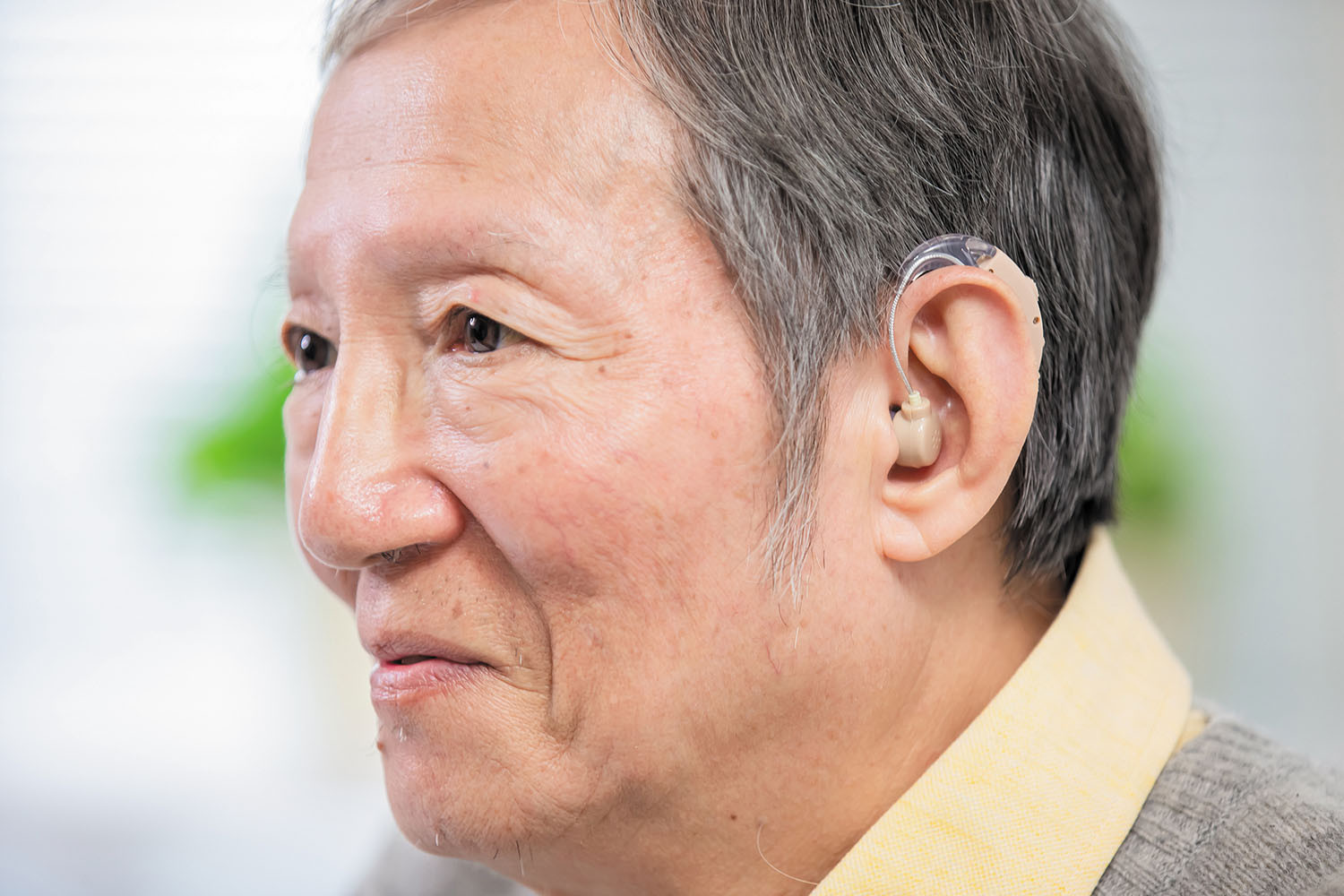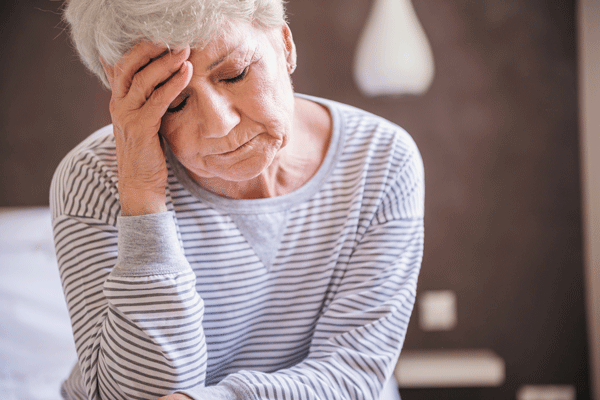
What are somatic workouts?

How to curb your stress eating

How to spot Parkinson’s disease symptoms

8 simple ways to reduce ultra-processed foods in your diet

Heart failure symptoms in women: How they’re different

GERD diet: Foods to avoid to reduce acid reflux

Strong is the new skinny

Everyday habits that sneakily weaken your bones

Don’t wait to get help for back pain

Correcting how you walk may ease osteoarthritis knee pain
Depression Archive
Articles
Do probiotics help relieve depression?
News briefs
Probiotic supplements containing helpful bacteria and yeast are marketed as a way to maintain a diverse mix of healthy gut microbes. Now, a review published online July 6, 2020, by BMJ Nutrition, Prevention & Health suggests that probiotic supplements may help relieve depression symptoms. Scientists evaluated seven clinical trials from the past 15 years, which tested a total of 12 different strains of helpful bacteria. One trial in the review tested a "prebiotic," a type of plant fiber that provides food for gut bacteria. Scientists concluded that 11 of these probiotics, either alone or combined with prebiotics, were potentially useful for relieving symptoms of depression, perhaps by reducing inflammation that could affect brain function. The studies were small and short-term, but taken together, they suggest a gut-based approach to maintaining emotional well-being is worth pursuing. In the meantime, talk therapy, exercise, and medications remain the most effective approaches to treat depression. To support your gut health without expensive probiotic supplements, enjoy foods that naturally contain probiotics, such as yogurt, kefir, and sauerkraut. The prebiotic powers of whole grains also may support a healthy gut.
Image: LightFieldStudios/Getty Images
Chronic pain linked to higher risk of heart attack and stroke
Research we're watching
People with chronic pain may be more likely to have a heart attack or stroke than those without chronic pain, according to a study published online May 7, 2020, by the journal Pain Medicine.
From 2001 to 2005, researchers identified 17,614 Taiwanese people who had used pain relievers for at least three months. The most common causes of pain were spinal disorders, arthritis, and headaches; the pain relievers included both over-the-counter drugs and prescription opioids. For the comparison group, researchers used 35,228 people without chronic pain who were matched by age and sex to those in the first group.
Minding your memory
Not all memory issues are cause for concern. Here is how to manage those annoying everyday lapses.
Everyone experiences the occasional "senior moment" as they age. You may misplace everyday items, fail to recall the name of someone you just met, or forget to do something. While these memory slips can be embarrassing and stressful, they usually don't mean that you are on a path to dementia.
"Some degree of memory lapses is a normal part of aging," says Lydia Cho, a neuropsychologist with Harvard-affiliated McLean Hospital. "You can't expect to hold on to all information you've gathered throughout your life, whether it was long ago or recent. It's not realistic or adaptive."
Women's group recommends more screenings for anxiety
Research we're watching
A national coalition of women's health organizations recommends screening all adolescent girls (ages 13 and older) and adult women for anxiety. The goal is to improve detection and treatment for this common condition. The Women's Preventive Services Initiative (WPSI) recommends screening to look for all types of anxiety disorders, such as panic disorder, social anxiety disorder, and generalized anxiety disorder, in addition to depression screenings, which are already recommended for adults, says the WPSI. It would be up to individual clinicians to determine how often to do the screenings and to refer women and girls for follow-up examinations and screening.
Image: fizkes/Getty Images
The mental side of cardiac rehab
If you have experienced a heart attack or undergone a heart procedure, don't neglect your mental health during recovery.
Recovery from a heart attack, heart failure, angioplasty, or heart surgery — what doctors call heart events — can be stressful. Depending on your condition, it may also involve cardiac rehabilitation. This medically supervised program focuses on exercise, diet, and lifestyle changes. While the primary focus is to help you physically, you also need to address your mental and emotional health.
"It's normal to have some anxiety and stress after a heart attack or heart surgery," says Dr. Christopher Celano, assistant professor of psychiatry at Harvard-affiliated Massachusetts General Hospital. "But how long these feelings linger, and whether they are also associated with symptoms of depression, can affect your rehab recovery success and potentially increase your risk of future problems."
How to recover from post-traumatic stress disorder
Normally associated with veterans, PTSD can also affect people of all ages who have experienced any kind of trauma.
Post-traumatic stress disorder (PTSD) is a severe and potentially debilitating mental health disorder that affects people who have experienced or witnessed a traumatic event. PTSD often occurs in combat veterans, but it can also strike older adults, and especially men.
About 70% of older men have been exposed to trauma at some point in life, according to the U.S. Department of Veterans Affairs. Many of these traumatic events are accidents (or near misses), injuries, or serious health issues.
Another strategy to cope with life’s dark times
News briefs
The United States is reporting increasing numbers of "deaths from despair" (suicide, drug overdose, or alcohol poisoning). Antidepressants and psychotherapy are often used to help people who are having a hard time coping with extremely difficult times and who are at risk for dying because of it. A recent Harvard study found that another strategy may also play a part in countering despair: attending religious services. The study, published online May 6, 2020, by JAMA Psychiatry, evaluated self-reported religious service attendance among 110,000 white, middle-aged men and women who were followed for about 30 years. Compared with never attending religious services, going at least once per week was associated with a much lower risk of death from despair: 68% lower for women and 37% lower for men. Researchers say that religious participation — regardless of affiliation — may serve as an antidote to despair and provide a sustained sense of hope, meaning, peace, and positive outlook. Also, faith-based organizations promote social engagement and connectedness and preach against self-injury and substance use. The study was observational and does not prove that regularly going to a religious service prevents death from despair. However, we know from other Harvard research that using religion to cope is associated with improved outcomes for people with severe psychiatric illness. Due to the pandemic, it may be difficult to attend your usual place of worship. Consider attending services via teleconference. If you attend in-person services, wear a mask and try to stay six feet away from others.
Image: © fstop123/Getty Images
Sound check on hearing aids
Don't wait to get hearing aids if you need them. They can improve your quality of life.
Hearing aids may be a symbol of advancing age, but they also can be your means to a healthier and more vibrant life.
Research continues to show that people with age-related hearing loss who get fitted for hearing aids tend to become more active. Some science has even suggested they have fewer cognitive issues.
Depression and heart disease: A two-way street
Watch for the warning signs of depression, which is often missed in people with heart disease.
Image: gpointstudio/Thinkstock
All people have days when they feel sad, gloomy, or down in the dumps. But if those feelings last for weeks and you gradually stop feeling hopeful or happy about anything in your life, you may have depression. Like heart disease, depression is common, so it's not unusual to have both conditions together. In fact, depression is about twice as likely to occur in people with heart disease compared with the general population. And people with depression face a heightened risk of heart disease.
"It's really important for people to be aware of this link and to get treatment for depression, because it can be very debilitating," says Dr. Christopher Celano, a psychiatrist at the Cardiac Psychiatry Research Program at Harvard-affiliated Massachusetts General Hospital.
Will an app keep you on your medication schedule?
News briefs
The use of electronic apps (applications) downloaded to a smartphone or laptop has been revolutionizing the way we do many tasks, including staying healthy and socially connected. And a review of studies published online Jan. 30, 2020, by BMJ Open suggests that certain apps may also help you do a good job of staying on your medication schedule. Researchers combed through nine randomized controlled trials that included about 1,000 mostly middle-aged and older adults with chronic health conditions such as cardiovascular disease, depression, or Parkinson's disease. People who used apps to support them in taking medications were twice as likely to report that they stuck to a medication regimen compared with people who didn't use apps. The study doesn't prove that apps are going to make people take their pills; the information in the study came from self-reported adherence, not objective measures like pill count or blood levels of drugs. But since these were randomized trials, the results probably are valid. And apps can help in many ways: you can use medication apps not only to set reminders to take medications and log when you've had them, but also to look up potential drug interactions, renew prescriptions, identify pills, and even find cheaper drug prices.
Image: Pornpak Khunatorn/Getty Images

What are somatic workouts?

How to curb your stress eating

How to spot Parkinson’s disease symptoms

8 simple ways to reduce ultra-processed foods in your diet

Heart failure symptoms in women: How they’re different

GERD diet: Foods to avoid to reduce acid reflux

Strong is the new skinny

Everyday habits that sneakily weaken your bones

Don’t wait to get help for back pain

Correcting how you walk may ease osteoarthritis knee pain
Free Healthbeat Signup
Get the latest in health news delivered to your inbox!
Sign Up











